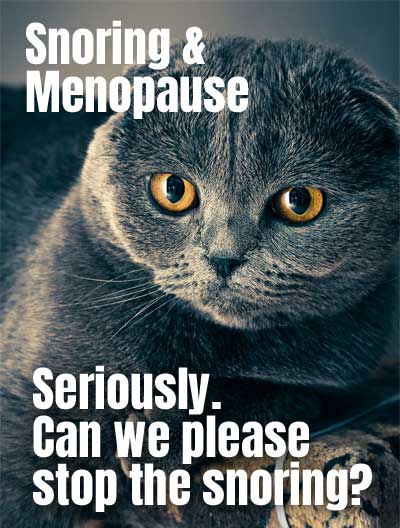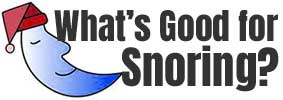 According to the National Sleep Foundation, many women report sleeping problems from peri-menopause to post-menopause.
According to the National Sleep Foundation, many women report sleeping problems from peri-menopause to post-menopause.
Complaints typically include insomnia, hot flashes, mood changes and sleep-disordered breathing, one symptom being snoring.
University of California Berkeley also confirms that the risk of snoring increases in women during menopause.
They also explain that people who consistently snore typically don’t suddenly stop snoring.
In other words, we need to take action to remedy the problem.
Ways We May Be Able to Prevent Snoring in Menopause
 First, they suggest avoiding heavy meals, alcohol, antihistamines and sleeping pills before bed. These factors can relax the throat muscles, thus inducing the tendency to snore.
First, they suggest avoiding heavy meals, alcohol, antihistamines and sleeping pills before bed. These factors can relax the throat muscles, thus inducing the tendency to snore.
Second, they recommend that overweight people lose weight. Sometimes this one change can minimize snoring all by itself.
Third, try sleeping on your side rather than your back because back sleepers often have their tongues falling back. Thus, it blocks the airways, and the snoring sound starts.
Fourth, elevate your head while sleeping. A simple wedge pillow can help.
How Hormone Changes Affect Snoring During Menopause
Changes in hormones like estrogen and progesterone can influence and disrupt sleep, says Dr Michael J Breus, PhD. In fact, he states that newer research shows a connection between hot flashes, night sweats and obstructive sleep apnea in menopausal women.
In addition, Dr Steven Park adds that progesterone acts as an upper airway stimulant. Plus, it can increase tongue muscle activity.
 This may explain why menopausal women with lower progesterone levels may experience sleep problems. And, why their sleep improves after taking progesterone.
This may explain why menopausal women with lower progesterone levels may experience sleep problems. And, why their sleep improves after taking progesterone.
According to the National Institute of Health, emerging evidence indicates that menopause-induced hormonal changes may be contributing to the increase in sleep problems. Specifically, they point to progesterone and estradiol, which may modulate sleep regulation and nighttime breathing.
The American Journal of Respiratory and Critical Care Medicine says that many people assume that normal hormone function is associated with less issues of sleep disordered breathing. However, they state that while some studies using hormonal replacement therapy (HRT) have reported effective, other studies have shown no effect.
Menopause and Snoring Symptoms
According to the Mayo Clinic the risk for developing obstructive sleep apnea increases in women during menopause. Common symptoms to look for include headaches, depression, anxiety and insomnia.
Therefore, if you notice that you have these symptoms and cannot otherwise explain why they are occurring, you may want to check if you snore. Some women find that they can minimize snoring issues and improve their sleep simply by implementing the strategies listed.
Snoring and Menopause: What DIY Methods You Can Try at Home
 Alternatively, you can try mouth tape for snoring, a mini snoring mouthpiece, the ZenSleep snoring solution or an anti-snore pillow, like the wedge.
Alternatively, you can try mouth tape for snoring, a mini snoring mouthpiece, the ZenSleep snoring solution or an anti-snore pillow, like the wedge.
On the other hand, if you suffer from occasional allergies, you may want to look into a nose piece for snoring.
For more information, see the article Major Sleep Disorders Among Women written by Sadeka Tamanna, MD, MPH, and Stephen A. Geraci, MD.
